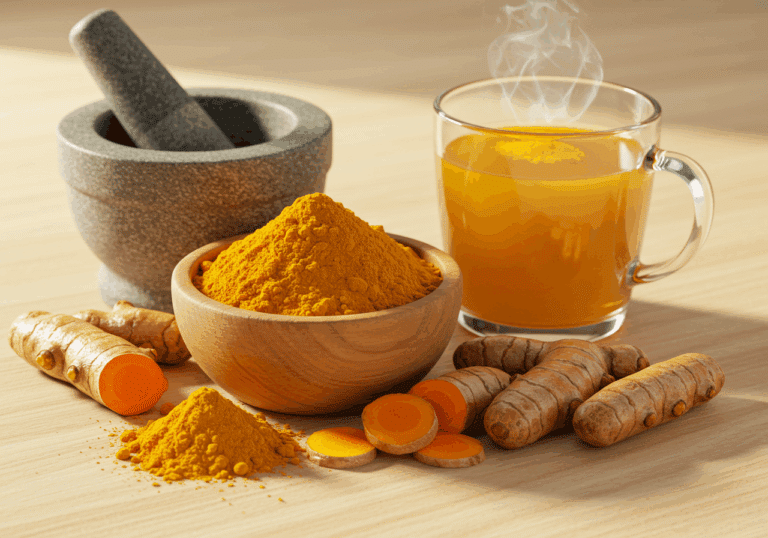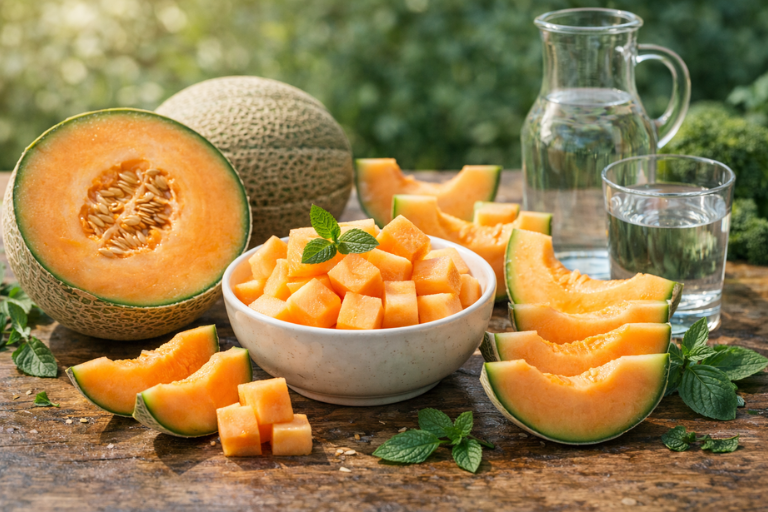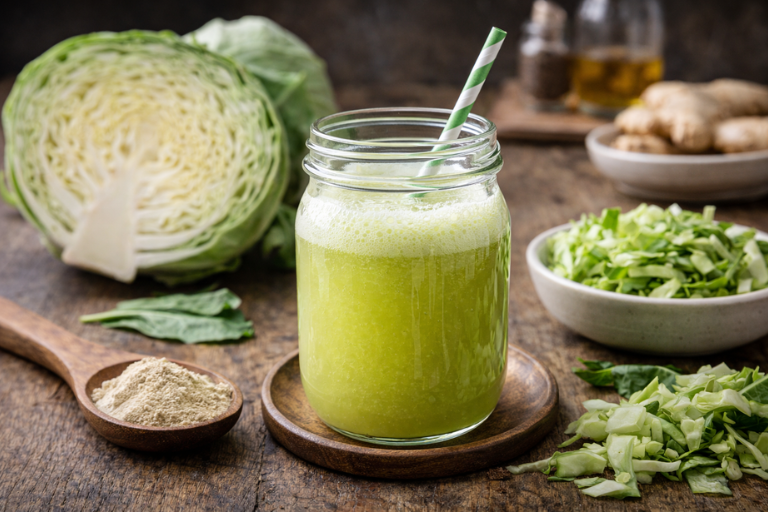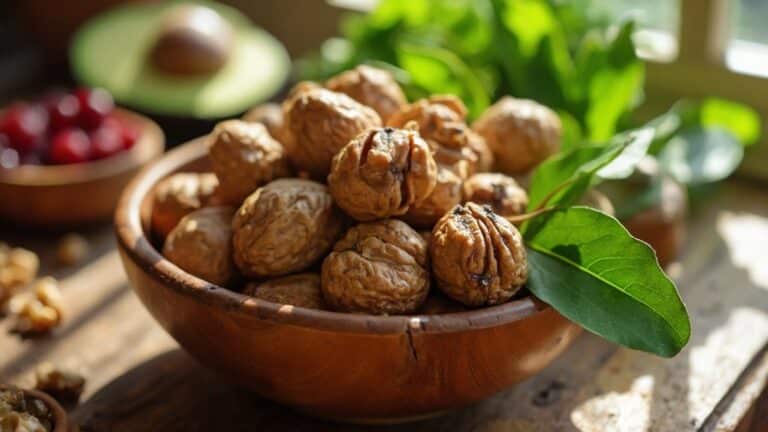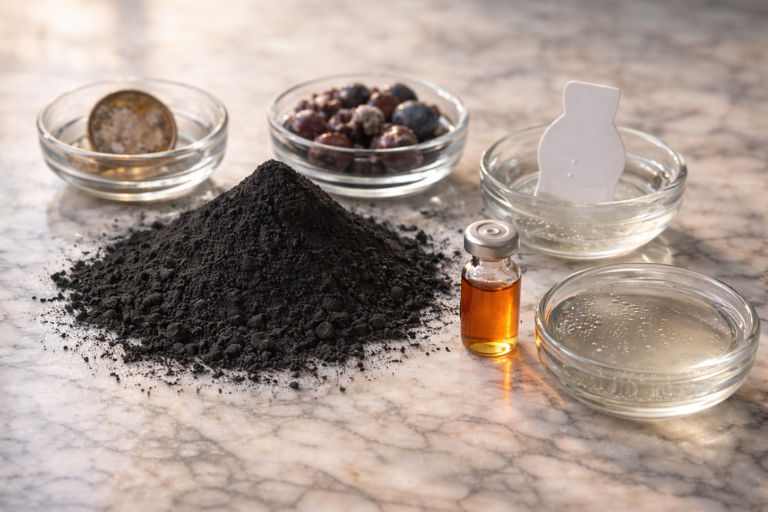Top 10 Health Benefits of Chia Seeds
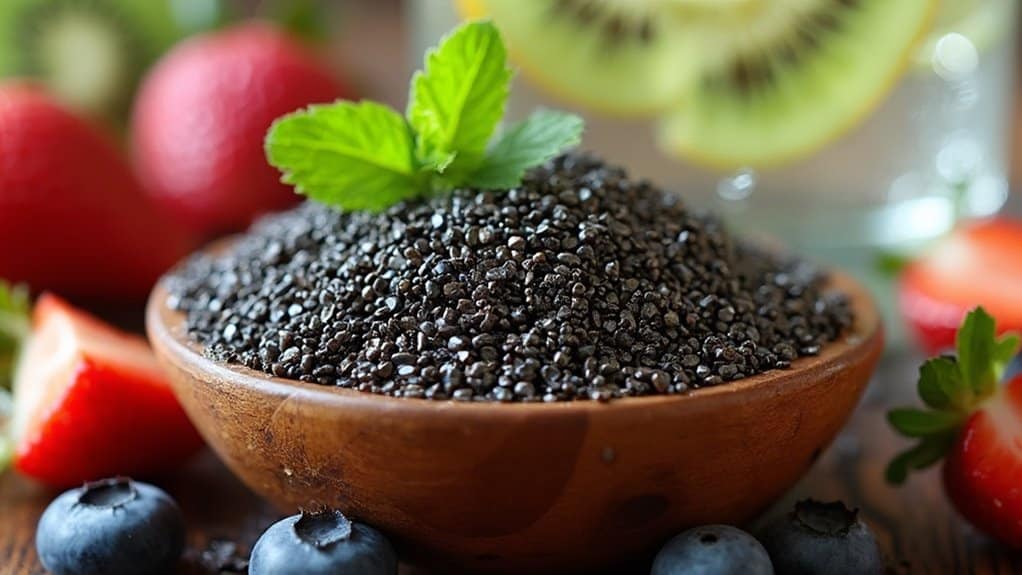
When it comes to superfoods, chia seeds often stand out for their impressive health benefits. You might not realize just how much they can enhance your diet and overall well-being. From supporting heart health to aiding digestion, these tiny seeds pack a powerful punch. If you’re curious about how they can fit into your lifestyle and what makes them so beneficial, stick around to discover the top ten advantages they offer.
Cardiovascular Health Benefits
When you incorporate chia seeds into your diet, you’re not just adding a nutritious food; you’re actively supporting your cardiovascular health. The soluble fiber in chia seeds helps lower LDL cholesterol, reducing your heart disease risk. Plus, the omega-3 fatty acids, particularly alpha-linolenic acid (ALA), may decrease inflammation and promote heart health. Additionally, chia seeds are high in fiber, which can also contribute to improved cholesterol levels. Research indicates that chia seeds are rich in essential nutrients, including magnesium and calcium, which further support heart function. Chia seeds are also the richest plant source of omega-3 fatty acids, making them a valuable addition to any heart-healthy diet.
Antioxidants like quercetin also protect your heart by reducing oxidative stress. Additionally, chia seeds are rich in minerals like magnesium, calcium, and potassium, which help regulate blood pressure and cholesterol levels. Some studies even suggest that regular consumption can lead to lower blood pressure, making chia seeds an excellent addition for anyone looking to enhance their cardiovascular well-being.
Nutritional Profile
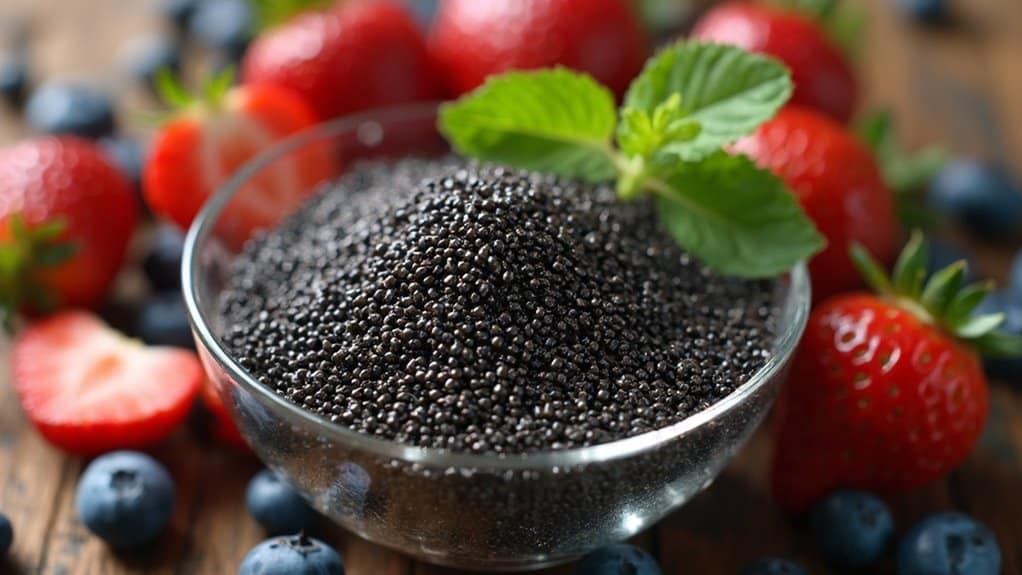
When you consider chia seeds, you’ll find they’re an excellent source of high-quality protein, containing all nine essential amino acids. They also pack a punch with essential nutrients like calcium, manganese, and phosphorus, which support overall health. In fact, these seeds are an excellent plant-based source of omega-3 fatty acids, promoting heart health and reducing inflammation. Incorporating these tiny seeds into your diet can boost your nutritional intake considerably. Furthermore, these seeds are rich in dietary fiber, which supports gut health and enhances feelings of fullness. Additionally, their high mineral content contributes to bone health and metabolic function, making them a valuable addition to any diet.
Protein Source Quality
Chia seeds stand out as a remarkable plant-based protein source, boasting a complete profile of all nine essential amino acids. With about 4.7 grams of protein per ounce, they provide a solid addition to your diet. These seeds include crucial amino acids like alanine and arginine, which are important for various body functions. While they offer quality protein, it’s best to combine them with other protein sources for ideal health. Additionally, chia seeds are rich in magnesium with about 40mg per serving, contributing to overall health benefits. Chia seeds are also gluten-free, making them suitable for those with gluten sensitivities. Plus, their gel-like consistency makes them easy to incorporate into your meals, enhancing both nutrition and texture. Furthermore, they are rich in omega-3 fatty acids, which promote heart and brain health.
Essential Nutrients Overview
Packed with a wealth of nutrients, chia seeds offer more than just a quality protein source. Each ounce contains about 138 calories, primarily from high fiber, with over 80% of their carbs coming from this essential component.
They’re about 31% fat, mainly polyunsaturated fatty acids, making them a great source of omega-3s. With roughly 9.8 grams of fiber per ounce, they support digestive health and help manage hunger.
Chia seeds are also rich in antioxidants, which combat free radicals and may reduce disease risk. Plus, they provide key minerals like calcium, magnesium, and iron, along with vitamins B1 and B3.
Incorporating chia seeds into your diet can enhance your overall nutrient intake and promote well-being.
Support for Diabetes Management
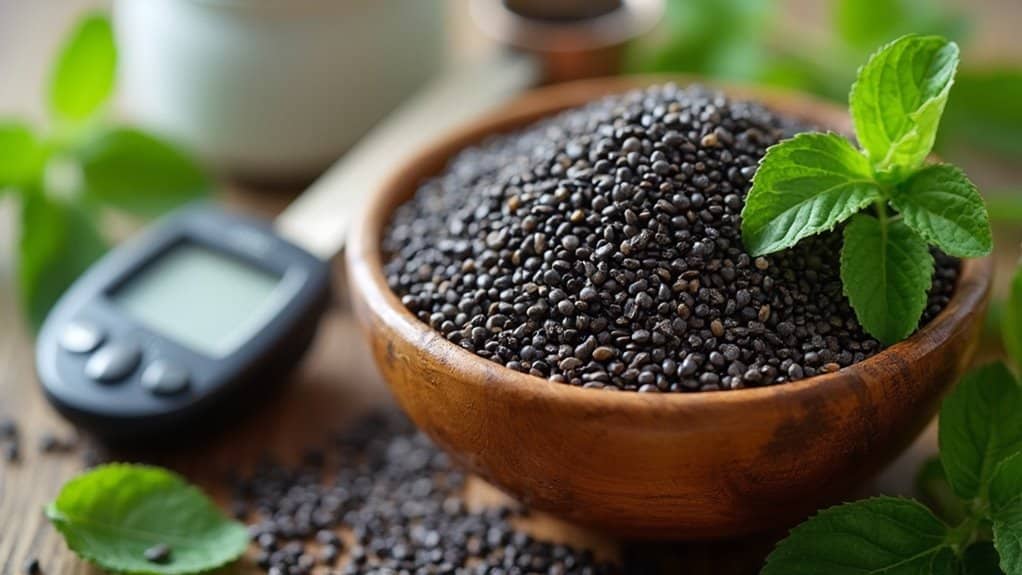
Chia seeds can play a significant role in managing diabetes by stabilizing blood sugar levels and regulating your appetite. Their high fiber content slows sugar absorption, preventing spikes in blood glucose. Plus, incorporating these nutrient-dense seeds into your diet can help you feel full longer, making it easier to maintain a healthy weight. Additionally, the low glycaemic index of chia seeds ensures that they do not cause rapid increases in blood glucose. Furthermore, their rich fiber content also aids in reducing insulin resistance, further improving blood sugar levels. Moreover, the seeds are packed with healthy fats that contribute to overall metabolic health and support balanced blood sugar levels.
Blood Sugar Stabilization
When managing diabetes, incorporating chia seeds into your diet can be a game-changer for blood sugar stabilization.
These tiny seeds are packed with fiber, which slows sugar absorption into your bloodstream, helping you avoid rapid glucose spikes. Their low glycemic index makes them a smart choice for your meals, ensuring steady energy levels throughout the day.
Additionally, the protein and omega-3 fatty acids in chia seeds support your overall metabolic health, further aiding in blood sugar control. By including chia seeds, you can reduce postprandial glucose peaks and enjoy their antioxidant benefits, which may help mitigate diabetes complications. Furthermore, their ability to support glycaemic control makes them a valuable addition to your diet. Chia seeds are also high in polyunsaturated fats, which can contribute to overall heart health, an important consideration for those managing diabetes.
Just remember, moderation is key to reaping these benefits while maintaining effective blood sugar management.
Appetite Regulation Support
Incorporating chia seeds into your diet can considerably enhance appetite regulation, especially for those managing diabetes. These tiny seeds are packed with dietary fiber, protein, and healthy fats, helping you feel full and satisfied.
When chia seeds absorb liquid, they swell, increasing stomach volume and promoting satiety. This can help you curb cravings and control calorie intake.
With about 34.4 grams of fiber per 100 grams, chia seeds support digestive health and stabilize blood sugar levels. Just remember to keep your intake around 20 grams daily to avoid any digestive issues.
Digestive Health and Weight Management
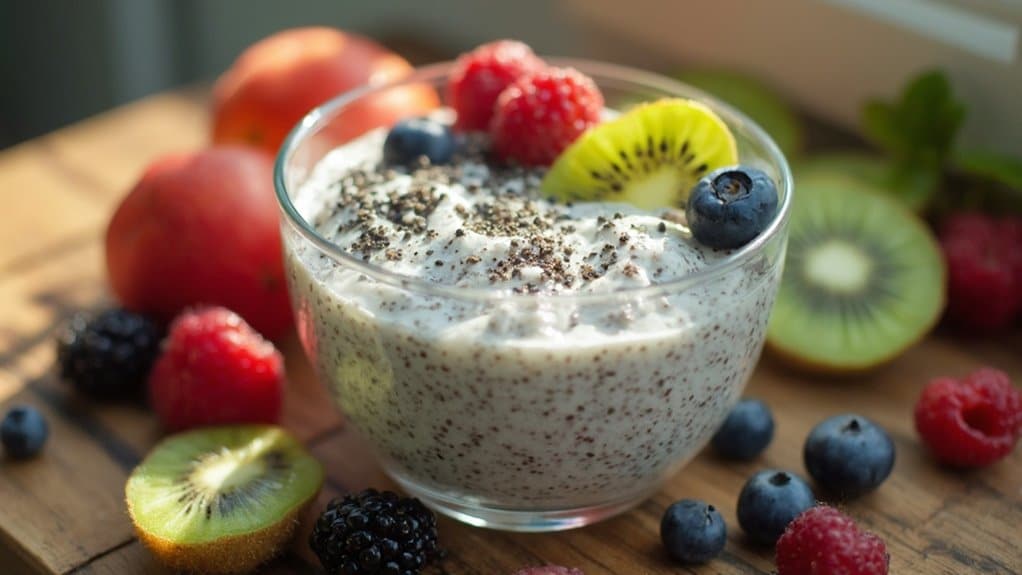
While many foods claim to support digestive health and weight management, chia seeds stand out due to their impressive nutrient profile.
Their high fiber content helps regulate bowel movements and prevents constipation, while also promoting beneficial gut bacteria. If you’re dealing with digestive discomfort, their low FODMAP levels make them a suitable choice, especially for those with IBS. Additionally, their ability to reduce inflammation in the gut can further alleviate symptoms such as bloating and abdominal pain. Chia seeds are also an excellent source of omega-3 fats, which support heart health and can enhance overall wellness. Moreover, their high calcium content contributes to bone health, providing essential nutrients for maintaining strong bones.
Chia seeds absorb water, forming a gel-like substance that increases feelings of fullness, helping you manage your weight. They slow digestion, which stabilizes blood sugar and curbs cravings.
Plus, their versatility means you can easily add them to smoothies, salads, or baked goods, making it simple to incorporate chia seeds into your daily diet for enhanced digestive health and weight management.
Anti-Inflammatory and Antioxidant Effects
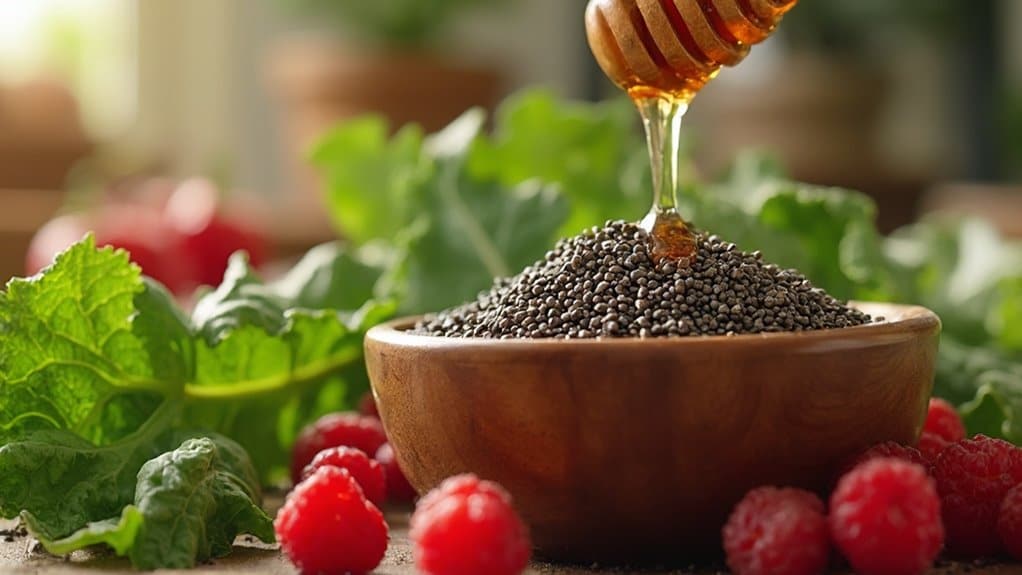
Chia seeds pack a powerful punch with their rich antioxidant content and omega-3 fatty acids. These nutrients can help reduce inflammation and support overall health. Additionally, chia seeds are identified as a superfood due to their nutrient-rich profile, which includes protein, fiber, and antioxidants. Furthermore, chia seeds exhibit hypoglycemic effects that can aid in managing blood sugar levels, making them particularly beneficial for individuals with diabetes.
Rich Antioxidant Content
Antioxidants play an essential role in protecting your body from the damaging effects of free radicals, and chia seeds are packed with these powerful compounds.
These tiny seeds contain tocopherols, phytosterols, carotenoids, and polyphenolic compounds, all known for their ability to neutralize free radicals and reduce the risk of chronic diseases.
The presence of caffeic acid helps minimize inflammation, while quercetin supports heart health by combating oxidative stress. Additionally, the anti-inflammatory properties of chia seeds may further enhance their protective effects against chronic disease development.
By incorporating chia seeds into your diet, you may lower the chances of developing diseases like diabetes and Alzheimer’s.
Their rich antioxidant content not only promotes overall well-being but also helps protect your cells from damage, contributing to a healthier, more vibrant life.
Omega-3 Fatty Acids
Packed with antioxidants, chia seeds also offer a remarkable source of omega-3 fatty acids, which play an essential role in promoting overall health.
About 60% of the fat in chia seeds comes from alpha-linolenic acid (ALA), making them one of the richest plant-based sources available. These omega-3s contribute to cardiovascular benefits by helping to lower cholesterol and blood pressure, reducing your risk of heart disease.
They also support cognitive function, providing potential brain health benefits. Including chia seeds in your diet can aid in balancing the omega-6 to omega-3 ratio, vital for overall well-being. Additionally, their high fiber content helps promote satiety, making them an excellent choice for weight management.
Whether you’re vegetarian or vegan, chia seeds are a valuable addition for meeting your omega-3 needs.
Inflammation Reduction Benefits
While many foods lack the ability to effectively combat inflammation, incorporating chia seeds into your diet can provide significant anti-inflammatory and antioxidant benefits.
These tiny seeds are packed with compounds like caffeic acid, which help reduce inflammation and protect against cell damage. By neutralizing free radicals, chia seeds mitigate oxidative stress, supporting heart health and potentially lowering cancer risk. In addition, diets high in Omega 6 fatty acids contribute to inflammation, making chia seeds a beneficial choice for those looking to balance their intake of Omega 3 and Omega 6 fatty acids.
Studies show that consuming chia seeds can decrease inflammatory markers like C-reactive protein (CRP), promoting a balanced inflammatory response.
With their high fiber content, chia seeds also enhance digestive health. You can easily add them to smoothies, yogurt, or oatmeal, making it simple to enjoy these powerful benefits every day.
General Health Benefits
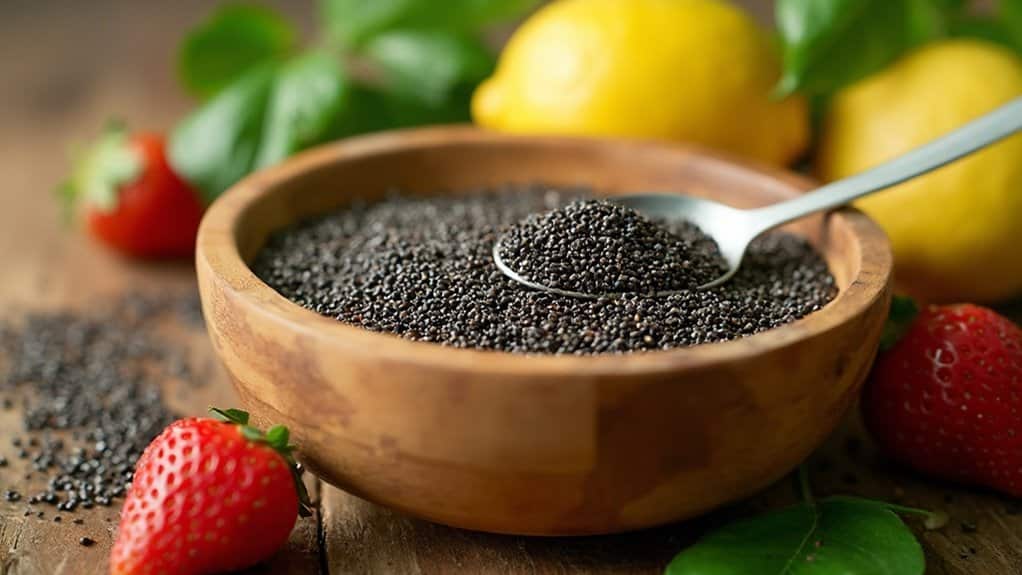
Chia seeds offer a wealth of health benefits that can enhance your overall well-being. Incorporating these tiny seeds into your diet can lead to significant improvements in various aspects of health.
Here are three key benefits:
- Digestive Health: The high fiber content helps prevent constipation, supports a healthy gut microbiome, and promotes smooth digestion. Additionally, the high fiber content of chia seeds fulfills about 30% of the daily fiber requirement for adults, further supporting digestive health.
- Weight Management: Soluble fiber increases feelings of fullness, helping you manage appetite and reduce calorie intake while providing sustained energy.
- Blood Sugar Control: Chia seeds slow down sugar absorption, improving insulin sensitivity and maintaining stable blood sugar levels.
Bone Health Support
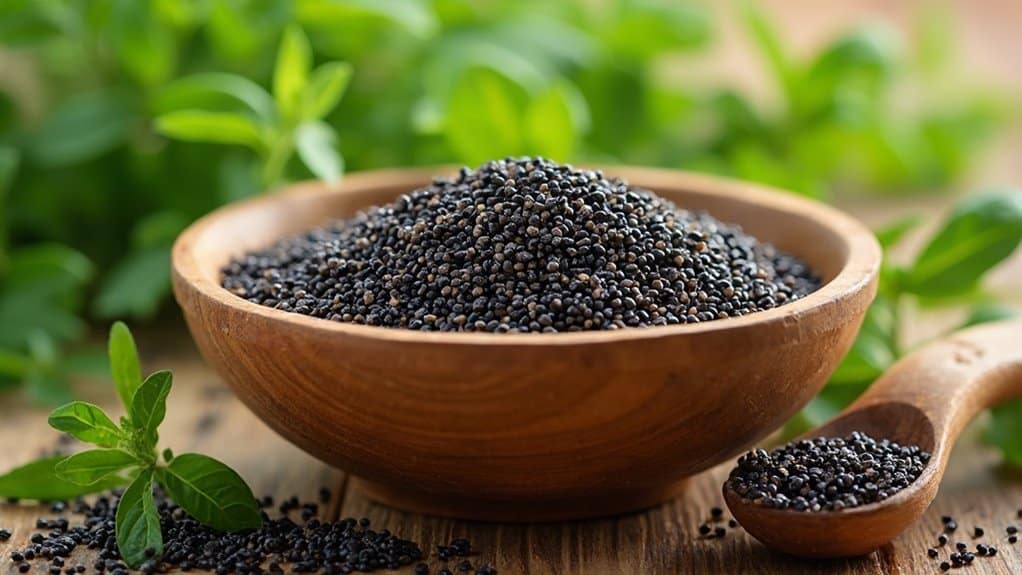
Maintaining strong bones is essential for overall health, and incorporating chia seeds into your diet can greatly contribute to bone health.
These tiny seeds pack a powerful nutritional punch, offering about 158mg of calcium per 25g serving, along with phosphorus and magnesium, all of which are crucial for bone density and strength. The rich source of minerals found in chia seeds not only supports bone health but also enhances overall skeletal strength.
The alpha-linolenic acid (ALA) found in chia seeds may even help enhance bone mineral density. Regularly consuming chia seeds can support osteoporosis prevention by fortifying your bones.
Their rich mineral profile aids calcium absorption and helps maintain hormonal balance necessary for bone growth.
Skin Health Improvement
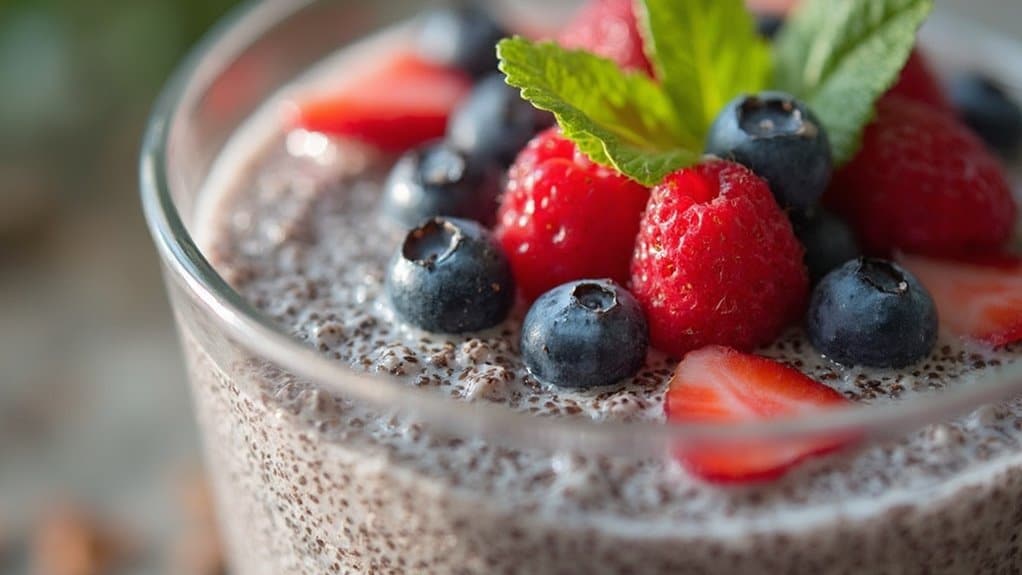
Chia seeds can be a game-changer for your skin health. Their rich omega-3 fatty acids bolster hydration and elasticity, while antioxidants combat free radicals, reducing signs of aging. Additionally, chia seeds‘ hydrophilic properties help maintain hydration levels in the skin. Furthermore, chia seeds are high in fiber, which aids in detoxifying the body and promoting clearer skin. Moreover, their ability to support collagen production contributes to skin firmness and elasticity.
Here are three key benefits of incorporating chia seeds into your diet:
- Hydration: Chia seeds absorb water, helping your skin retain moisture for a healthy glow.
- Wound Healing: Essential minerals like zinc and magnesium aid in recovery from minor skin injuries.
- Anti-Inflammatory: Omega-3s soothe irritation, making chia seeds beneficial for conditions like acne and eczema.
Versatile Culinary Uses
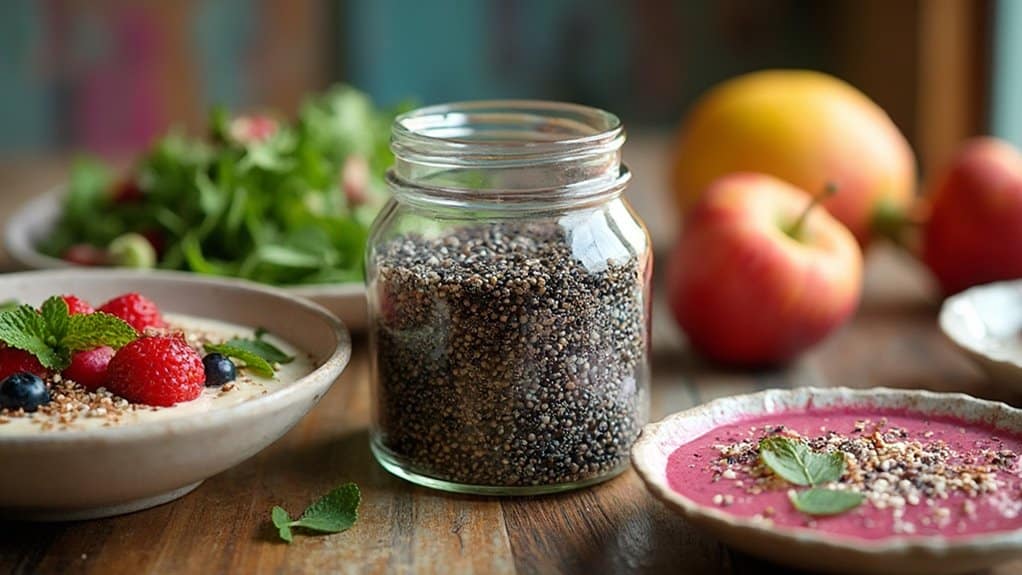
How can you enhance your meals while boosting your health? Chia seeds are incredibly versatile and can be easily integrated into various dishes.
You can add them to baked goods like muffins and cakes for extra fiber and omega-3s. Blend them into smoothies or juices for a nutritious thickening agent. Soaked chia seeds create a gel-like texture perfect for puddings, making them a delicious option for healthy desserts. Additionally, they are a rich source of omega-3 fatty acids, which support heart health. Incorporating chia seeds into your meals can also promote digestive health due to their high soluble fiber content.
Try incorporating chia seeds in salad dressings or as a meat coating for added texture and nutrients. They also work well in cereals or as vegan egg substitutes in baking.
Whether you’re aiming for a crunchy snack or a protein boost, chia seeds can elevate your culinary creations while supporting your health.
Enhanced Energy and Endurance
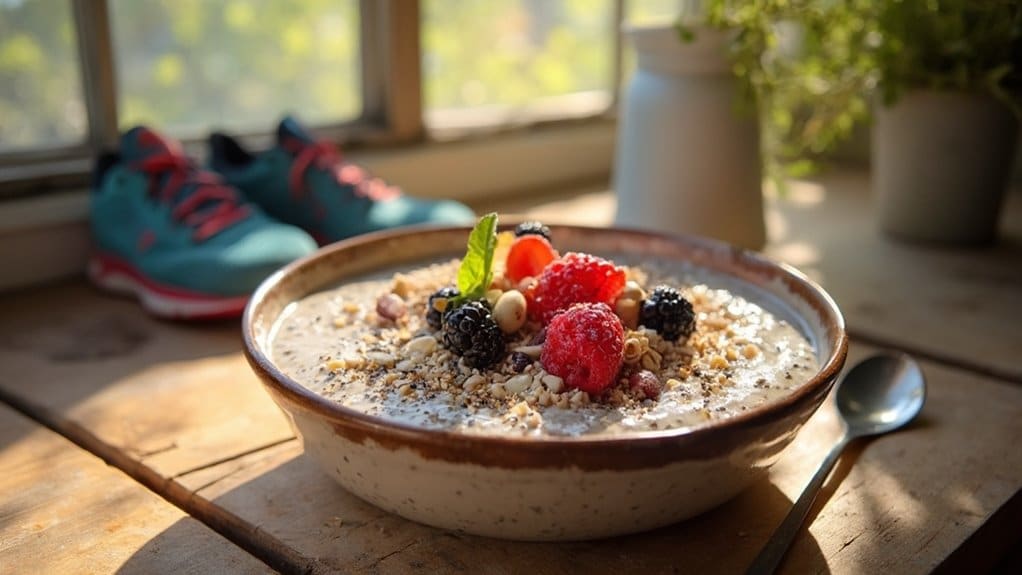
When you want to boost your energy and endurance during workouts, chia seeds can be a game changer. These tiny powerhouses provide sustained energy, keeping your blood sugar stable while you push through your routine.
Here’s how they can enhance your performance:
- Hydration Support: Chia seeds absorb up to 12 times their weight in water, helping you stay hydrated during intense activities. Additionally, their ability to absorb water helps maintain hydration levels over longer periods, ensuring you stay at your best. This remarkable hydrophilic property contributes to overall cellular health. Furthermore, they are a fundamental ingredient in energy gels for athletes, making them an ideal choice for endurance training.
- Omega-3 Fatty Acids: They reduce inflammation and improve blood flow, which is essential for better cardiovascular performance.
- Complete Protein: Chia seeds contain all nine essential amino acids, aiding muscle recovery after strenuous workouts.
Incorporating chia seeds into your diet helps you maintain energy levels and enjoy a more effective exercise session.
Frequently Asked Questions
Can Chia Seeds Help With Hydration During Exercise?
Yes, chia seeds can definitely help with hydration during exercise. They absorb water, forming a gel that retains fluids in your body, ensuring you stay hydrated and energized throughout your workout.
Are There Any Side Effects of Consuming Chia Seeds?
Yes, consuming chia seeds can have side effects. You might experience bloating, gas, or digestive discomfort if you don’t drink enough water. Allergic reactions are rare, but they can occur, so monitor your body’s response.
How Should Chia Seeds Be Stored for Freshness?
To keep your chia seeds fresh, store them in an airtight container in a cool, dry place away from sunlight. For longer freshness, refrigerate or freeze them, and always check for spoilage before use.
Can Chia Seeds Be Eaten Raw or Cooked?
You can eat chia seeds both raw and cooked. Raw seeds retain all their nutrients, while cooking enhances their texture. Try them in smoothies or oatmeal, or use them in baking for added nutrition.
What Is the Recommended Daily Intake of Chia Seeds?
The recommended daily intake of chia seeds is about 1 ounce, or 28 grams, which equals roughly 2 tablespoons. You can safely consume up to 50 grams daily to enjoy their numerous health benefits.
Conclusion
Incorporating chia seeds into your diet can greatly boost your health and well-being. With their impressive nutritional profile and numerous benefits, from heart health to improved digestion, these tiny seeds are a powerhouse of nutrients. Plus, their versatility makes them easy to add to various meals and snacks. So, whether you sprinkle them on your yogurt or blend them into a smoothie, you’ll be taking a simple step towards a healthier lifestyle. Enjoy the benefits today!
References
- https://news.oregonstate.edu/news/new-study-eyes-nutrition-rich-chia-seed-potential-improve-human-health
- https://massh.in/blogs/top-10-health-benefits-of-chia-seeds-you-should-know
- https://www.health.harvard.edu/nutrition/chia-seed-benefits-what-you-need-to-know
- https://continentalhospitals.com/blog/10-health-benefits-of-chia-seeds/
- https://www.webmd.com/diet/health-benefits-chia-seeds
- https://www.healthline.com/nutrition/11-proven-health-benefits-of-chia-seeds
- https://nutritionsource.hsph.harvard.edu/food-features/chia-seeds/
- https://www.heart.org/en/news/2019/07/19/know-the-flax-and-the-chia-a-little-seed-may-be-what-your-diet-needs
- https://www.healthline.com/nutrition/chia-seeds
- https://www.afpafitness.com/blog/11-benefits-of-chia-seeds-why-you-should-include-them-in-your-diet/

